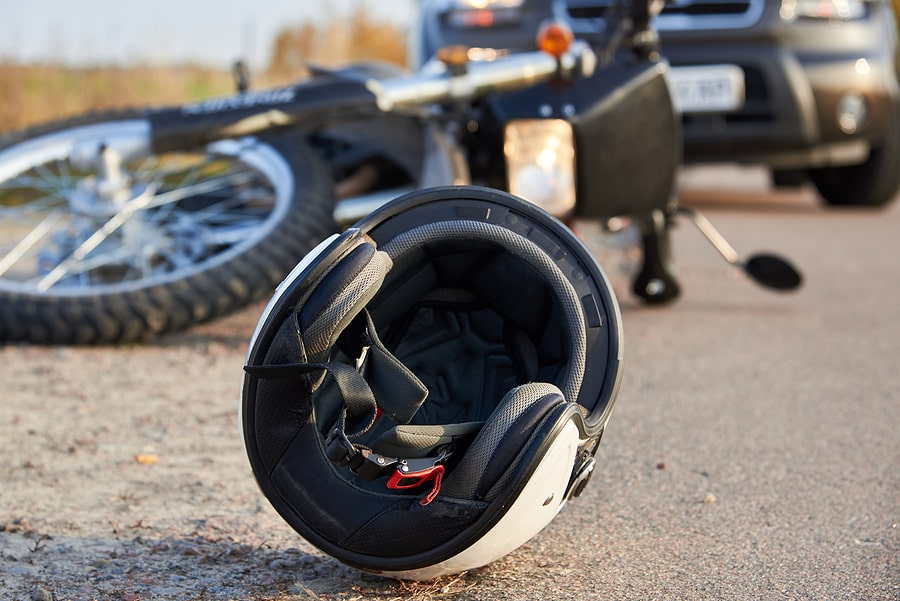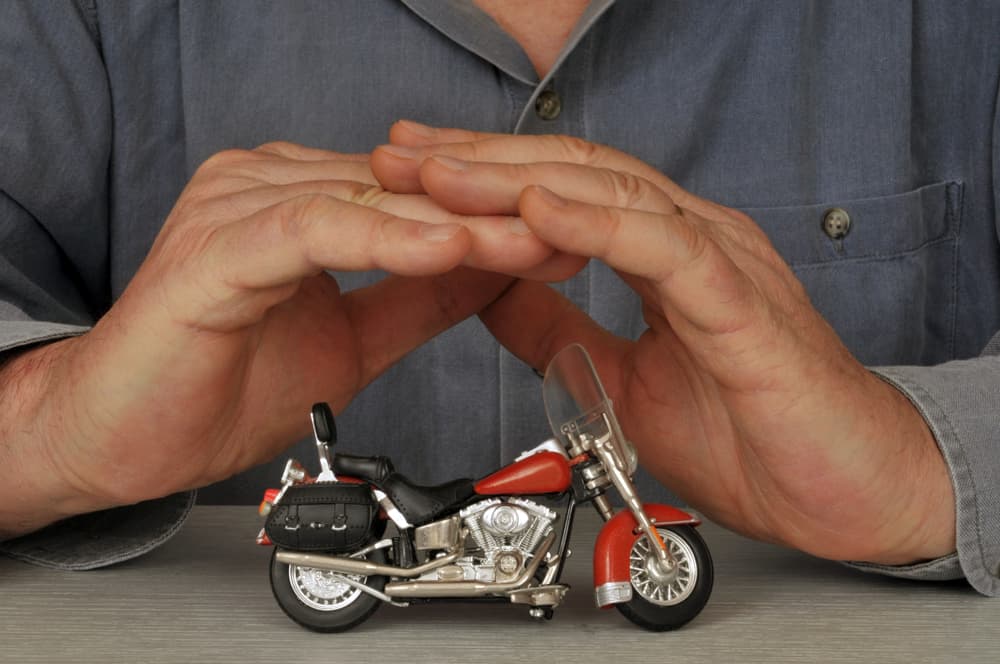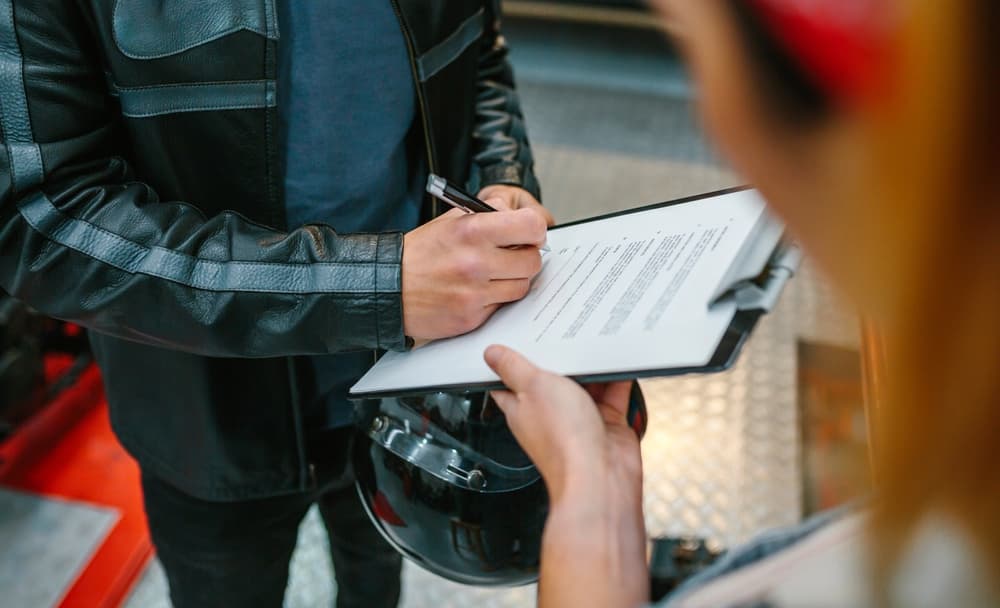Motorcycle accidents can lead to traumatic and disorienting physical injuries, emotional distress, and financial struggles. The steps you take after a motorcycle crash are necessary for your well-being and protecting your legal rights.
When you’re unsure of what to do following your motorcycle collision, do not hesitate to ask for help. A Richmond motorcycle accident attorney can provide the guidance and support you need during a difficult time and protect your rights as they pursue justice and compensation on your behalf.
Understanding Motorcycle Accidents
Motorcycle accidents are unlike other collisions, like car and truck accidents. These collisions are unique and result in different types of challenges.
Motorcycles are inherently dangerous. A motorcycle provides no protection in an accident like a car does with airbags and seatbelts. Therefore, motorcyclists can suffer catastrophic, life-changing injuries. In a recent year, over 82,000 motorcyclists suffered injuries in accidents.
In addition to all the difficulties motorcyclists face following an accident, they often have to deal with negative reputations. Motorcycle riders are usually regarded as dangerous risk-takers with zero regard for others. This is not always true, and when it comes to motorcycle accidents, this can result in fault disputes.
Motorcycle accident cases are hard to navigate for numerous reasons. Therefore, it’s best to have legal representation.
Common Causes of Motorcycle Collisions
Motorcycle accidents result for various reasons.
Often, these collisions result from negligent drivers engaging in dangerous driving behaviors, such as:
- Inattentive driving
- Speeding
- Impaired driving
- Failure to yield
- Unsafe turns and lane changes
Other factors contributing to motorcycle collisions include poor road conditions, inclement weather, and mechanical failures.
You need to understand the cause of your motorcycle crash. In some cases, an investigation must determine the cause of a collision. Knowing the cause of your accident helps ensure you pursue compensation from the appropriate party.
Injuries Resulting from Motorcycle Accidents
While every case is different, motorcycle injuries are usually severe. In many cases, injuries from a motorcycle collision can result in life-altering consequences.
Common injuries from motorcycle crashes include:
- Road rash
- Broken bones
- Neck injuries
- Traumatic brain injuries
- Spinal injuries
- Internal injuries
- Facial injuries
- Crush injuries
While riding gear, like helmets and gloves, can sometimes help reduce the severity of injuries, they are usually insufficient to prevent serious physical harm. After an accident, motorcycle riders can face long roads to recovery and permanent bodily changes, including paralysis, nerve damage, and cognitive issues.
Liability for Motorcycle Crashes
Liability for a motorcycle accident can lie with one person alone, but more than one party may be responsible.
Fault depends on the cause of the collision, but liable parties can include:
- Car and truck drivers
- Drivers’ employers
- Governmental entities
- Repair and maintenance companies
- Product designers and manufacturers
If liability is uncertain or disputed, a motorcycle accident lawyer can investigate your collision, gather evidence, and strengthen your claim to prove responsibility for your accident, injuries, and losses.
What To Do Following a Motorcycle Accident
The steps you take in the hours, days, and weeks after a motorcycle collision can strongly affect your rights as a victim and your future compensation claim. The following steps can ensure you take care of your well-being while also preparing for your case.
Seek Medical Attention Right Away
One of the most important things you can do following a motorcycle accident is seek medical attention. If severe injuries require emergency treatment, EMTs can render aid on the scene. Should you need further care, they can transport you to the hospital.
Whether you receive medical treatment immediately after your accident, you should still follow up with a healthcare provider as soon as possible after your collision.
A thorough physical evaluation can document the severity of your injuries and allow you to begin receiving appropriate treatment. Depending on your physical state, your doctor may perform a physical exam and order additional testing, including X-rays and MRIs.
Medical attention is critical because some injuries can develop and worsen if not immediately treated. For example, internal injuries don’t always show physical symptoms right away. If you don’t get medical care, you may not know you’ve suffered these injuries, and by the time you find out, it can be much worse.
Begin Collecting Evidence
Evidence plays a significant role in motorcycle accident cases. Depending on the circumstances, you may have the opportunity to get some evidence and information on the scene, such as witness contact information.
In the days after your accident, collect everything related to your accident. Keep a detailed record of all expenses related to your accident, including medical bills and out-of-pocket expenses. Also, take photos of your injuries and document your recovery process. It can all help illustrate the full extent of your damages.
Consult with a Motorcycle Accident Attorney
A motorcycle accident attorney can offer invaluable assistance. Your lawyer will help you understand your legal rights and options, including the possibility of pursuing compensation.
An attorney can substantially improve the outcome of your case. They will negotiate with insurance companies, and protect your rights. When you have a lawyer on your side, you can feel more confident and at peace throughout the process. Don’t wait, call today.
The Importance of Receiving Medical Care Following a Motorcycle Accident
As mentioned, one of the most essential things you should do after a motorcycle accident is to seek medical attention. Aside from prioritizing your health, it can substantially improve your case.
Every detail is documented in your medical records when you receive medical care, whether at a hospital, doctor’s office, rehabilitation center, or the like. Your medical records are a huge part of your case.
They can help prove many details, including the severity of your injuries and the full extent of your medical expenses. Without strong medical documentation, you’ll have more difficulty proving your case.
Getting initial medical treatment and following through with your treatment plan are vital. Your medical records will continue to reflect progress as you progress through your recovery. It can further exhibit the degree of your injuries, any complications arising in the process, and whether you’ll require long-term care.
Insurance companies put a large emphasis on medical records in motorcycle accident cases. Should they note any discrepancies, they won’t hesitate to use them against you.
Getting appropriate medical care can ensure your healing and put you in a much better position to receive the compensation you deserve.
What Not to Do After a Motorcycle Collision
While there are things you should do following a motorcycle accident, there are also things you should not do. Avoiding certain actions can help you continue safeguarding your rights to compensation and allow you to obtain the financial recovery you need.
Speak to the Insurance Company
You can often expect a call when you file a claim with another driver’s insurance company. When insurers contact you, they usually request a recorded statement to get your side of the story.
Although seemingly routine and innocent, the insurance company is just fishing for something to use against you. Accident victims may ramble on, and within what they say, the insurer may find something to use to harm the victim’s claim.
If the insurance company contacts you, be careful with what you say. You should decline their request for a recorded statement and inform them they can speak with your lawyer.
Post on Social Media
In the age of social media, people want to share different aspects of their lives, especially big events like motorcycle accidents.
However, do not post on social media after a collision. Insurance companies and opposing parties may use your posts against you. Avoid sharing details about the accident or your injuries online.
Accept an Initial Settlement Offer
The point of filing an insurance claim is to get compensation; the quicker, the better. Insurance companies know that victims prefer to settle cases speedily, and they use this to their advantage.
Insurance companies commonly submit settlement offers very soon after accidents. While you may feel tempted to say yes and sign on the dotted line, discuss it with a lawyer before making any decisions.
Usually, quick settlement offers do not represent the full extent of your damages and future needs. If you agree without thoroughly assessing the offer, you may miss out on the compensation you could’ve received.
Should the insurance company contact you with a settlement offer, don’t make any decisions without first discussing it with a motorcycle accident lawyer. Your lawyer can thoroughly evaluate your offer to determine whether it’s fair. If not, your lawyer can make a counteroffer and negotiate a settlement on your behalf.
Wait Too Long to Speak with a Lawyer
When you face severe injuries and emotional distress after a motorcycle accident, you’re not likely to want to take action to seek compensation immediately. It is understandable. Nonetheless, the longer you wait, the greater your risk of losing your chance to take action.
Statutes of limitations limit the time you have to file a lawsuit. Depending on your state's laws, you may only have a few years. You’ll lose your right to financial recovery if you fail to file your claim on time.
The sooner you consult a motorcycle accident lawyer after a collision, the better. Your attorney can review the details of your situation, create a plan for your case, and begin working to pursue the compensation you’re owed.
Taking Action Following a Motorcycle Collision
You may have a valid compensation claim when you suffered an injury in a motorcycle accident. Your road to financial recovery varies based on the circumstances but can involve an insurance claim, a lawsuit, or both. A motorcycle accident attorney can determine the best action to seek damages on your behalf.
Filing an Insurance Claim
When the responsible party carries insurance, you can file a third-party claim through their insurance.
After you open your claim with the insurance company, they assign an adjuster to handle your claim. The adjuster investigates the accident, including the resulting injuries and property damages. The adjuster can approve or deny your claim based on their findings.
Should your claim be approved, the insurance company provides a settlement offer to close out your claim. Your attorney can assess the offer to ensure its fairness. If the offer is worth less than your claim, your lawyer can negotiate with the insurance company and take further action if necessary.
If the insurance company denies your claim, it doesn’t necessarily mean the end of the road. Your motorcycle accident attorney will determine the next steps.
Filing a Personal Injury Lawsuit
If the at-fault party is uninsured, or the insurance company is unwilling to settle your claim justly, your motorcycle accident attorney can take legal action. Your lawyer can handle every case-related task, from filing your claim to engaging in pre-trial settlement negotiations.
Most personal injury lawsuits, like those involving motorcycle accidents, settle before trial. However, if the opposing party makes it impossible to settle, your attorney can take your case before the judge and fight to get you a favorable award.
After a Motorcycle Accident, Seek Legal Representation Right Away
A motorcycle accident can be a life-changing event, but knowing how to handle the situation effectively can make a significant difference in your recovery and the outcome of your claim.
Prioritizing your safety and health and seeking professional assistance from an experienced motorcycle accident attorney can make all the difference in your case and your future.
Remember, you should act quickly when it comes to seeking legal representation after a motorcycle accident. The statute of limitations restricts the time period in which you can file a personal injury lawsuit.
Don't wait until it's too late to secure the legal help you need. Contact a trusted personal injury lawyer with experience in motorcycle accident cases to discuss your options and start building your case.




